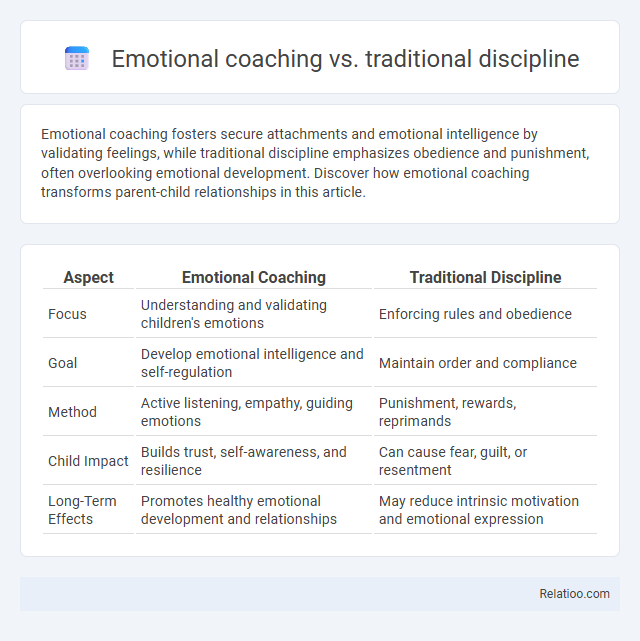Emotional coaching fosters secure attachments and emotional intelligence by validating feelings, while traditional discipline emphasizes obedience and punishment, often overlooking emotional development. Discover how emotional coaching transforms parent-child relationships in this article.
Table of Comparison
| Aspect | Emotional Coaching | Traditional Discipline |
|---|---|---|
| Focus | Understanding and validating children's emotions | Enforcing rules and obedience |
| Goal | Develop emotional intelligence and self-regulation | Maintain order and compliance |
| Method | Active listening, empathy, guiding emotions | Punishment, rewards, reprimands |
| Child Impact | Builds trust, self-awareness, and resilience | Can cause fear, guilt, or resentment |
| Long-Term Effects | Promotes healthy emotional development and relationships | May reduce intrinsic motivation and emotional expression |
Understanding Emotional Coaching
Emotional coaching emphasizes recognizing and validating Your child's emotions to foster emotional intelligence and resilience, unlike traditional discipline that often relies on punishment and behavior correction without emotional context. Understanding emotional coaching involves guiding children to label their feelings and develop healthy coping mechanisms, which improves communication and strengthens the parent-child bond. This approach promotes long-term emotional well-being by teaching self-regulation rather than simply enforcing rules.
What Is Traditional Discipline?
Traditional discipline focuses on enforcing rules through punishment or consequences to shape behavior, often emphasizing obedience and control. Emotional coaching, by contrast, guides Your child to understand and manage their feelings, fostering emotional intelligence and self-regulation. While traditional methods rely on external control, emotional coaching cultivates internal motivation and empathy.
Core Principles of Emotional Coaching
Emotional coaching centers on recognizing and validating children's feelings, guiding them to understand and manage emotions effectively, contrasting with traditional discipline that often prioritizes obedience and punishment. Core principles of emotional coaching include empathy, active listening, and helping children develop emotional awareness and problem-solving skills. This approach fosters secure attachment and emotional intelligence, promoting long-term psychological resilience.
Key Methods in Traditional Discipline
Traditional discipline primarily relies on clear rules, consistent consequences, and external control to modify behavior, emphasizing obedience and authority. Key methods include punishment, rewards, and structured routines aimed at immediate compliance rather than emotional understanding. You can enhance traditional discipline by integrating emotional coaching techniques to address your child's feelings and promote long-term emotional growth.
Emotional Impact on Children
Emotional coaching fosters children's emotional intelligence by validating feelings and guiding constructive expression, leading to improved self-regulation and empathy. Traditional discipline often emphasizes obedience and punishment, which can cause fear, confusion, and hinder emotional development in children. Emphasizing emotional coaching over traditional discipline supports healthier emotional impact by promoting resilience, secure attachment, and long-term psychological well-being.
Communication Styles Compared
Emotional coaching emphasizes open dialogue, active listening, and validating feelings to foster understanding and emotional growth, contrasting with traditional discipline's directive and often punitive communication style that prioritizes obedience over emotional expression. You benefit from emotional coaching through empathetic conversations that encourage self-regulation and problem-solving, enhancing trust and connection. The communication style in emotional coaching centers on collaboration and mutual respect, while traditional discipline typically relies on commands and consequences to enforce behavior.
Benefits of Emotional Coaching
Emotional coaching fosters children's emotional intelligence by validating feelings and teaching effective coping skills, leading to improved self-regulation and stronger parent-child relationships. Unlike traditional discipline, which often relies on punishment and control, emotional coaching encourages empathy and communication, reducing behavioral problems over time. This approach supports long-term mental health and social competence by helping children understand and manage their emotions constructively.
Challenges with Traditional Discipline
Traditional discipline often relies on punishment and strict rules, leading to misunderstandings and resistance from children. Emotional coaching encourages recognizing and validating your child's feelings, fostering better communication and emotional development. You can overcome challenges with traditional discipline by adopting empathetic strategies that promote trust and self-regulation.
Long-Term Outcomes for Children
Emotional coaching fosters secure attachment and emotional intelligence by teaching children to recognize and manage their feelings, leading to better mental health and social skills over time. Traditional discipline often relies on punishment and control, which may suppress emotions but fails to develop long-term self-regulation or empathy. Research indicates that emotional coaching significantly improves long-term outcomes such as academic success, resilience, and healthy interpersonal relationships compared to traditional discipline methods.
Choosing the Best Approach for Your Family
Emotional coaching fosters self-awareness and empathy by guiding Your child to understand and manage their feelings, whereas traditional discipline emphasizes obedience and punishment to enforce rules. Choosing the best approach for Your family involves balancing emotional support with clear boundaries, tailoring strategies to promote healthy development and respectful communication. Prioritizing emotional intelligence alongside consistent discipline creates a nurturing environment that encourages long-term behavioral growth and resilience.

Infographic: Emotional coaching vs Traditional discipline
 relatioo.com
relatioo.com